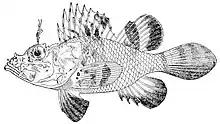| Pteroidichthys noronhai | |
|---|---|
 | |
| Scientific classification | |
| Domain: | Eukaryota |
| Kingdom: | Animalia |
| Phylum: | Chordata |
| Class: | Actinopterygii |
| Order: | Scorpaeniformes |
| Family: | Scorpaenidae |
| Genus: | Pteroidichthys |
| Species: | P. noronhai |
| Binomial name | |
| Pteroidichthys noronhai (Fowler, 1938) | |
| Synonyms[2] | |
|
Pteropelor noronhai Fowler, 1938 | |
Pteroidichthys noronhai, Noronha’s scorpionfish, is a species of marine ray-finned fish belonging to the family Scorpaenidae, the scorpionfishes. It is found in the central western Pacific Ocean.
Taxonomy
Pteroidichthys noronhai was first formally described as Pteropelor noronhai in 1938 by the American ichthyologist Henry Weed Fowler with the type locality given as near Hong Kong.[3] The genus Pteroelor was subsequently recognised as a synonym of Pteroidichthys.[4] The specific name honours Adolfo César de Noronha who was director of the Museu de História Natural do Funchal in Madeira.[5]
Description
Pteroidichthys noronhai has 12 rigid spines and 8-9soft rays in its dorsal fin with 3 spines and 5 soft rays in its anal fin. It has a relatively short snout, which avareages 15.3% of its standard length and is shorter than the distance between the rearmost part of the orbit and the rear edge of the operculum. The rearmost part of the maxilla reached beyond a vertical line through the centre of the pupil. It has poorly developed tentacles above the eyes and just a small number of tantacles on the body and fins. There are well developed spinjes with pointed tips on the lacrimal and suborbital bones.[6] This species has no clear black blotch on the front part of the soft rayed part of the dorsal fin and attans a maximum total length of 5.6 cm (2.2 in).[2] This is a brown fish with indistinct darker markings on the head and on the back at the base of each part of the dorsal fin. The fin membrane of the spiny part of the dorsal fin is black at its base and grey distally, the membrane of the soft rayed part is blotched with grey and is darker grey terminally, The other fins are greyish with black margins.[7]
Distribution and habitat
Pteroidichthys noronhai is found in the Indo-West Pacific and has been recorded from widely separated localities. It has been found in southern Japan, southern China, Saya de Malha Bank, Taiwan, .the Philippines, northwestern Australia, the Chesterfield Islands and Vanuatu. It is a demersal fish found at depths between 50 and 215 m (164 and 705 ft) in areas of sandy substrate.[1][2]
References
- 1 2 Motomura, H.; Matsuura, K. (2016). "Pteroidichthys noronhai". IUCN Red List of Threatened Species. 2016: e.T69799144A69801017. doi:10.2305/IUCN.UK.2016-3.RLTS.T69799144A69801017.en. Retrieved 27 January 2022.
- 1 2 3 Froese, Rainer; Pauly, Daniel (eds.) (2021). "Pteroidichthys noronhae" in FishBase. August 2021 version.
- ↑ Eschmeyer, William N.; Fricke, Ron & van der Laan, Richard (eds.). "Species in the genus Pteroidichthys". Catalog of Fishes. California Academy of Sciences. Retrieved 27 January 2022.
- ↑ Motomura, H. & Kanade, Y. (2015). "Review of the scorpionfish genus Pteroidichthys (Scorpaenidae), with descriptions of two new species". Zootaxa. 4057 (4): 490–510. doi:10.11646/zootaxa.4057.4.2.
- ↑ Christopher Scharpf & Kenneth J. Lazara, eds. (2 October 2021). "Order Perciformes (Part 9): Suborder Scorpaenoidei: Family Scorpaenidae". The ETYFish Project Fish Name Etymology Database. Christopher Scharpf and Kenneth J. Lazara. Retrieved 27 January 2022.
- ↑ Dianne J. Bray. "Pteroidichthys noronhai". Fishes of Australia. Museums Victoria. Retrieved 28 January 2022.
- ↑ Fowler, H. W. (1938). "Descriptions of new fishes obtained by the United States Bureau of Fisheries steamer "Albatross", chiefly in Philippine seas and adjacent waters". Proceedings of the United States National Museum. 85 (3032): 31–135.
